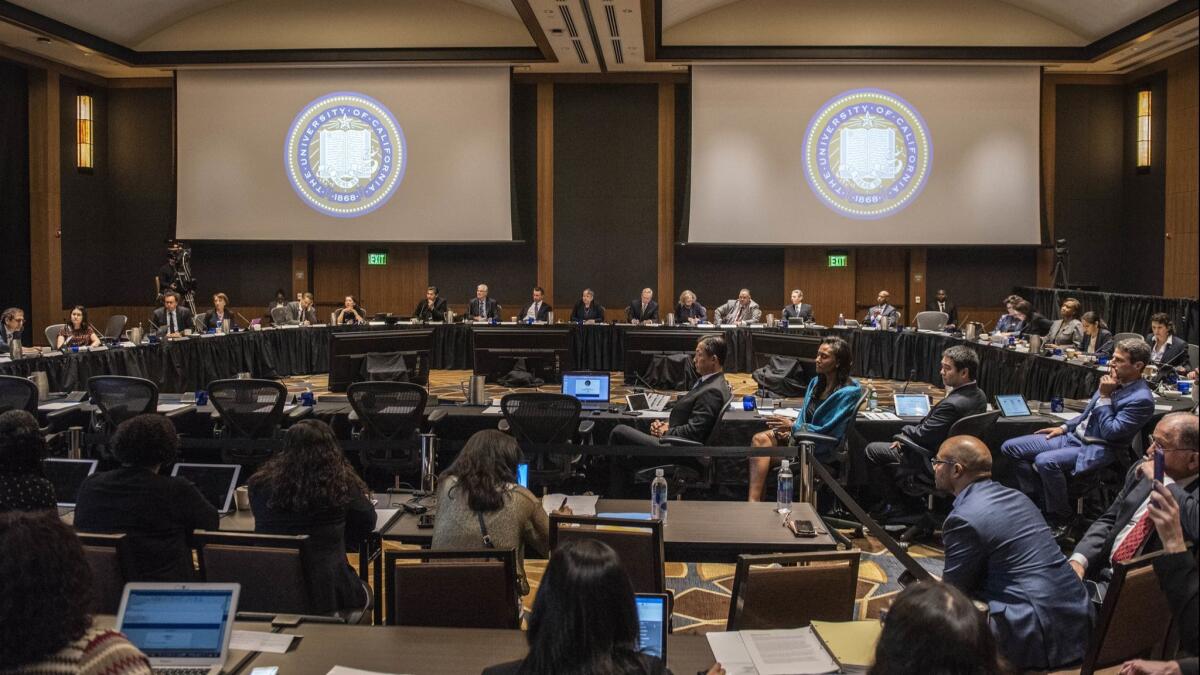UC regents want to boost enrollment and graduations. They hope Newsom will chip in

Reporting from San Francisco — University of California regents this week will take their first collective look at the inaugural budget proposal of Gov. Gavin Newsom, who has pledged to boost higher education spending after years of fiscal frugality under his predecessor, Jerry Brown.
Regents also will discuss plans to increase enrollment, raise graduation rates and improve support for struggling students in their two-day meeting that begins Wednesday in San Francisco.
UC officials, who sometimes had conflict with the recently retired Brown, are hoping to turn a corner with Newsom, who regularly attended board meetings as an ex-officio regent while he was lieutenant governor.
“There’s a new sense of direction and optimism on the board, and with the Legislature and the governor,” said UC Board of Regents Chairman George Kieffer.
However, the budget blueprint Newsom unveiled this month fell short of the regents’ hopes. They requested an increase of $477.6 million in permanent, ongoing funding for the 2019-20 budget that they approved last November. Newsom proposed an increase of only $240 million.
UC, for instance, is aiming to enroll an additional 2,500 Californians this fall, as part of an ambitious push to award 200,000 more undergraduate degrees by 2030 to meet the state’s projected workforce needs. Although Newsom’s proposal includes $10 million to support current enrollment, it provides no new funds for more seats next year.
Still, in a joint statement last week, Kieffer and UC President Janet Napolitano called Newsom’s proposal “a welcome step and a solid down payment.”
Kieffer said he was hopeful that the university system could work with the governor and the Legislature to secure more money to support its four-year strategic plan, which will be a big focus of this week’s meetings. UC leaders say the blueprint to boost enrollment, improve students’ academic performance and reinvest in faculty and research is meant to reignite the “California Dream” for the next generation.
Goals include raising undergraduate graduation rates, and closing gaps in completion rates for those students who are low-income, underrepresented minorities or the first in their families to attend college.
UC officials want all nine undergraduate campuses to graduate 90% of their transfer students within four years. Currently, only UC Berkeley, UCLA and UC Irvine do so. The strategic plan also calls for Berkeley, UCLA, Davis, San Diego and Santa Barbara to hit a six-year graduation rate of 90% for freshmen by 2030. So far, only Berkeley and UCLA have reached that goal.
At the two-day meeting, campus leaders will detail some of their strategies to improve graduation rates, including better summer transition programs, more comprehensive fall orientations, better academic advising, more online courses and more mentoring.
In other matters, regents will discuss a high-profile plan by UC Santa Cruz to build student housing on a campus meadow. The proposal has sparked widespread controversy, pitting those who want to keep the meadow pristine against others who argue it’s the best choice to solve the university’s severe housing crunch.
UC students, who have fought to increase their input in university decisions, are divided on another issue that regents plan to discuss: whether to eliminate the board’s student advisor.
The UC Student Assn. favors phasing out the position, which was created two years ago, in part because the selection process for it lacks adequate consultation from students, according to UCSA President Caroline Siegel Singh. Singh and others suggest trying different ways to bring the opinions of students into UC policymaking.
Twitter: @TeresaWatanabe
More to Read
Sign up for Essential California
The most important California stories and recommendations in your inbox every morning.
You may occasionally receive promotional content from the Los Angeles Times.











